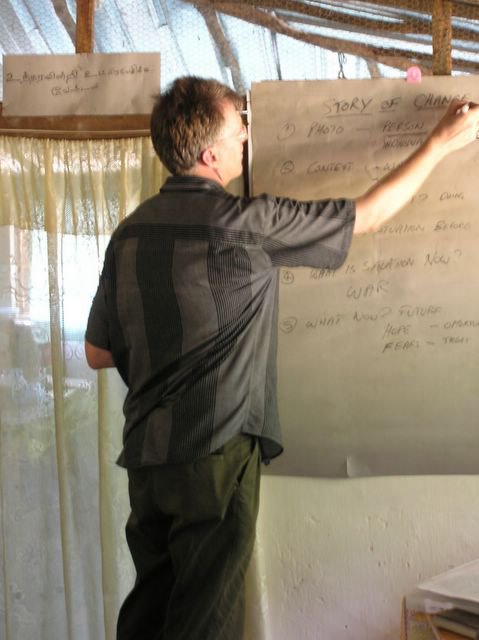Our trip to Batticaloa was a much more more sedate affair. Our colleagues in NPSL took us from Vavuniya to Habarana, almost the last town before you enter a vast area of scrub land and jungle, the home to many of Sri Lankas remaining wild elephants. This separates Batticaloa from traditional ancient homeland of Sri Lankan Buddhism. Often referred to as 'border country, it separates the predominately Buddhist/Sinhalese areas of the south and west and the predominantly Hindu/Tamil areas of the East and North. It is dramatically beautiful, driving through the low mountains, via the ancient ruins of long gone kingdoms, to the plains of arid scrub, and the now ageing fox-holes of the military and small their new 'fortresses' which dot the landscape.
The barren landscape on the road to Batti.
We came to visit some of the local partners and stakeholders of the NPSL programme here to try and explain to them why NP now feels it is time to strategically exit from Sri Lanka. Part of this process of withdrawal is to accelerate the programme of training and strengthening of local agencies and individuals. We aim to strengthen their skills to be their own peace builders. Our own tailor-made 'Unarmed Civilian Peacekeeping' training tries to impart basic skills in conflict mapping, mediation skills and mitigation of potential threats. It is vital to understand the nature of conflicts within ones own community, to identify incipient conflicts that might become violent and then by using mediation and negotiating skills to mitigate those threats.
Three young people here in Manmunai West tell us how they are using the skills they learnt in our UCP training.
The Katunkudy Mediation Panel is one group who have been able to do our USP training and Christine and I meet some of them by chance at the entrance to the Katunkudy District Secretary's Office after we'd had a short meeting with her. Here we learnt that their mediation panel, the lowest rung of the Judiciary in Sri Lanka, has already heard 3000 complaints since it was appointed 2 years ago. "We meet every Sunday", the chairman of the mediation panel told us, a school principle. He explained "we then appoint a small panel of three to each case and many times we are able to get a compromise between parties." Some cases involve land rights which are a constant problem as people are resettled or return home after years of being displaced due to the conflict.
Thursday, March 31, 2011
Friday, March 25, 2011
A Visit North and East
 |
| Add caption |
Now that was a big mistake. None of the romance of a gentle easy trip through the night, awaken refreshed in the early morning for a productive day's work. None of it! I just sifted through my emails that night and one says,, 'arrived in Vavuniya station 5.30am feeling like I have been in an automatic washing machine at high spin".
Here are the NPSL staff in Vaviniya and the Child Rights Defenders who met us after our train ride.
Well the exhaustion of the journey of 8 hours was rapidly made up for by the fascinating series of meetings. The focus of the NPSL work in Vavuniya is Child Rights Protection. To that end NPSL works with the Government National Child Protection Authority and local civil society groups and we focus on villages that have been resettled after the end of the long violent conflict which has so affected this region.
We learnt of the host of problems faced by children, defined as those aged from 0 to 18yrs. Many communities have not only been uprooted and moved once but had their lives disrupted many times. Through the last few decades the battle lines have moved and shifted constantly.
Most impressive of those we met were the young Child Rights Defenders. This is a group of late teen and early (twentie-somethings) youth, who are trained as volunteers to help identify vulnerable children. They had an animated discussion with us about their work. One lad offered that it was largely because of the training he'd done with NPSL that he'd secured his first paid job. He is now a child rights staff with the local NGO called Sarvodaya. A Young Child Rights Defender Describes the Work He Does
'What are the most common problems you find?' we asked. 'Family values have really been shaken by the disruption of war and the disintegration of family networks. Many sons and fathers have been killed or disappeared or now languish in prison or some other form of detention. With other families mothers have gone overseas in search of work', explained Dharshini, a 25yr old young mother, another volunteer working with NPSL
 |
| A Women's Group in Batticaloa acts out a drama showing the prevalence of child abuse. |
Subscribe to:
Comments (Atom)





